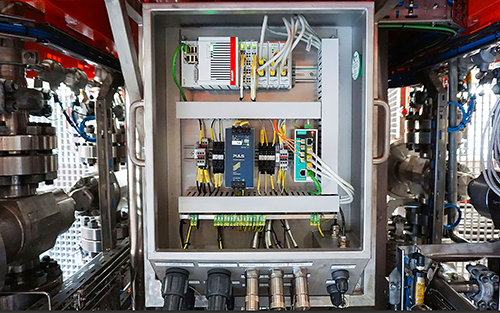- October 31, 2022
- Moxa Technologies Inc
- Case Study
Summary
The combination of Moxa's robust hardware and FourPhase's innovative solutions and services is transforming the process of oil-and-gas recovery.

Crude oil recovery covers four major elements: oil, gas, water and solids. Traditionally, the focus is on oil, gas, and water, while solids, which can negatively affect production, are often overlooked. This is despite 70% of reservoirs globally running into production difficulties because of solids congesting filters and bypassing the separator, causing wellbore blockage and shutdowns.
FourPhase, a Bergen, Norway company, has designed and delivered effective solids management solutions and services at over 80 project sites, including the North Sea, Gulf of Mexico, and South China Sea, with several global oil giants. One of its solids recovery solutions is the "Brain Box." It that acts as a central nervous system to manage communications between recovery equipment, such as desanders, surface safety valves, and HMI screens, and transmit processing data through Ethernet to a cloud-based control room. The Brain Box is deployed directly downstream from the wellhead, onshore or offshore, where it must deal with saltwater, heavy rains, storms, or extreme heat of up to 50°C. These harsh environments require ruggedized communications devices to meet the environment's demands.
The Brain Box relies on Moxa EDS 200/300 Series unmanaged switches featuring Ethernet and 100BaseFX fiber ports, and Moxa AWK Wi-Fi industrial-grade 802.11n access points. During operations, sensors collect data every 10 to 100 milliseconds, gathering a significant amount of data. This data is transmitted back to an offshore database, ranging from once every minute to once every hour, based on the recovery application. Transmitted data is accessed from an OPC UA server running Modbus, TCP/IP, and HMI protocols. To ensure the critical data gets transmitted, FourPhase uses the Moxa AWK Wi-Fi access points to create redundant on-site data transmissions via wire and wireless mechanisms.
FourPhase typically installs its equipment in ATEX Zone 2 hazardous locations. These areas have frequent oil and gas leaks therefore requiring electronic devices certified to be explosion-proof. Moxa has a complete series of products with Class 1, Div. 2/ATEX Zone 2 certificates, giving FourPhase the flexibility to choose from a large portfolio of suitable devices for different situations, including the number of ports, mounting design, and fiber-optic extensions.
So far, FourPhase has run over 100,000 performance hours on its systems and separated over 600,000kg of solids. Each system features Moxa devices capable of providing up to 2,000,000 hours of operations.

"We have used Moxa products in all our connected equipment since we founded FourPhase. I honestly don't recall we ever had an issue with Moxa's products, and we haven't had a single minute of downtime with the products, which is compelling," reported Jørgen Bruntveit, FourPhase's COO & CTO.
The combination of Moxa's robust hardware and FourPhase's innovative solutions and services is transforming the process of oil-and-gas recovery. In contrast with the industry's traditional reactive approaches involving basic equipment and manual operations, FourPhase is using data-driven solutions to forge the advancement of prescriptive maintenance strategies in the management of solids. This approach minimizes downtime and assists oil-and-gas producers in increasing their production capacity while reducing their carbon footprint.
Did you enjoy this great article?
Check out our free e-newsletters to read more great articles..
Subscribe

